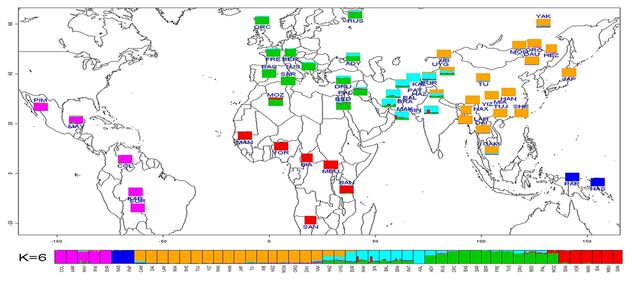Genetics
Science, Magical Thinking, and Your Genetic Ancestry
When it comes to genetics, does anyone really know what they are talking about?
Posted May 7, 2021 Reviewed by Vanessa Lancaster
Key points
- To engage in the conversation, scientists must differentiate the terms "race" and "population" from the start.
- Scientists correctly claim "race" is a social construct, not a proper scientific category.
- Scientists often use the term "population" instead of “race,” but the difference this label makes is unclear.

A favorite personal saying — the words fell into place one afternoon when talking with my son about science — is this one: "If you start off on the wrong foot, you'll end up somewhere." A search on Google cannot find anyone who claims priority for this saying. The expression "starting off on the wrong foot," of course, is familiar enough: "To have a bad start. Said of something that goes or has gone awry at the very beginning."
As silly as perhaps this cliché-in-the-making may sound, this has become a core message whenever I teach students or lecture before a popular audience. Every time I use the saying, I follow up with a second observation. Although you'd think today's scientists should know better, they often make assumptions — technically called "prior assumptions" — about what is real and what is possible that, as my mother used to say, "just plain don't make any sense at all." Why? I suspect scientists don't realize they are making such assumptions.
Take, for example, what scientists are still saying — even well into the 21st century — about human genetics and the biological diversity of our species.
Race, reason, and human genetics
Here's the problem in the proverbial nutshell: Lots of well-meaning people, including most scientists, will tell you that the so-called human races aren't real, that they are social constructs, not proper scientific labels or categories.
So far, so good. But then 99 times out of 100, or so it seems, they blow it. They commit what might be called an unintentional bait and switch. They stop talking about "races" and start talking about "populations." Ouch. What on earth is the difference between a race and a population?

I am not making this problem up. Here's an example. How to Argue With a Racist: History, Science, Race, and Reality (2020) is a beautifully written and mercifully short new book by the journalist and geneticist Adam Rutherford. He points out that by the time you dig back just 1,000 years into the past, each of us has statistically speaking far more than a trillion ancestors, which is many times over more people than have ever lived on Earth.
But if all you have to go by is your DNA, it may be a foolish endeavor to try to claim anyone in particular as your ancestor. As I and many others have pointed out, if you go back, say, to the 17th or 18th century, the number of alive individuals then who could have contributed to your genetic endowment is large (more than 1,000). But their likely genetic contribution to you is small (about 0.098 percent for 10 generations back). Therefore, it is smoke and mirrors to try to pin down precisely who your ancestors are if all you have to "read" is DNA from spit or a buccal swab. In other words, almost all those now-dead 1,000 or so individuals have contributed absolutely no trace of themselves to you biologically. Are you listening, AncestryDNA?
O.K. Got it. But then what does all this have to do with the question I asked earlier? Why are geneticists and others willing to talk about "populations" if they say we must not talk about "races"? What's going on here? Is this an example of the well-known logical fallacy called "making a distinction (for political reasons perhaps?) without a difference"? Or could it be that they are unaware that they started on the wrong foot and unintentionally ended up in the wrong place?
An unintentional fallacy or a deliberate bait and switch?
As I see it — I have written here about this before — the sort of brain that evolution has given us favors categorical reasoning, or as I sometimes like to call it, "barcode thinking." Without repeating the argument, our brains want to put things into mental boxes variously called types, kinds, categories, and so forth. Hence, it is hard to talk about noticeable physical differences within our species without sounding like a racist who believes humans come in different types, kinds, and categories.
As the history of race and racism in the United States and elsewhere worldwide make painfully clear, talking about our diversity as a species without sounding and being unintentionally racist is hard to do.1 Even as talented a writer as Adam Rutherford says something at the end of his new book that sounds confusing if not racist:
We are born with differences coded into our cells. People are born different, look different, and behave differently. We have innate characteristics scored into our DNA. These differences vary between people, and between populations. But, as we have seen, the way we generally speak about races does not align with what we know about those innate differences between people and populations. Genetics and the evolutionary history of humans do not support the traditional or colloquial concepts of race.
I don't know about you, but I don't know what to make of what he says (particularly the phrases I have highlighted). This does not sound like someone who has found a better way to discuss our diversity as a species. It sounds more like someone who wants us to think and talk about race in "non-traditional or colloquial" ways.
If you think I am too critical, ask yourself: What is the difference in meaning Rutherford wants us to make between the word "race" and the word "population"?
Please do not think that Rutherford himself is the target of my criticism. I believe his new book shows how difficult it is even for scientists to abandon the concept of race and develop more scientific ways to think about and understand our evident diversity as a species.
But also, please don't dismiss what I am saying here. If you want further proof that it is confusing, and even plainly wrong, to use the word "population" rather than "race" without definition and explanation, then here is something to chew on.
If you look up the word "population" in the index at the back of Rutherford's new book, this is what you find:
population. See race
I don't know what to make of this redirection. To me, it sounds like someone who started off on the wrong foot.
References
1. As shown by the review of Rutherford's book published in the New Scientist last year, other ways commonly used nowadays to talk about our diversity as a species are the similarly ambiguous expressions "ethnicity" and "ethnic group," which are among the small handful of now popular "go-to" words and phrases favored, so one doesn't sound like a racist. See: Layal Liverpool, "How to Argue with a Racist smashes race myths that plague society," New Scientist magazine issue 3268, 8 February 2020.
2. It has been pointed out that Rutherford, as is common, probably hired an indexer. I don't think it is stretching a point too far, however, to infer either (a) after reading the page proofs of Rutherford's manuscript, the indexer had concluded Rutherford intended these two words to mean the same thing, or (b) Rutherford was comfortable with this entry when he reviewed the work that the indexer had done for him.




